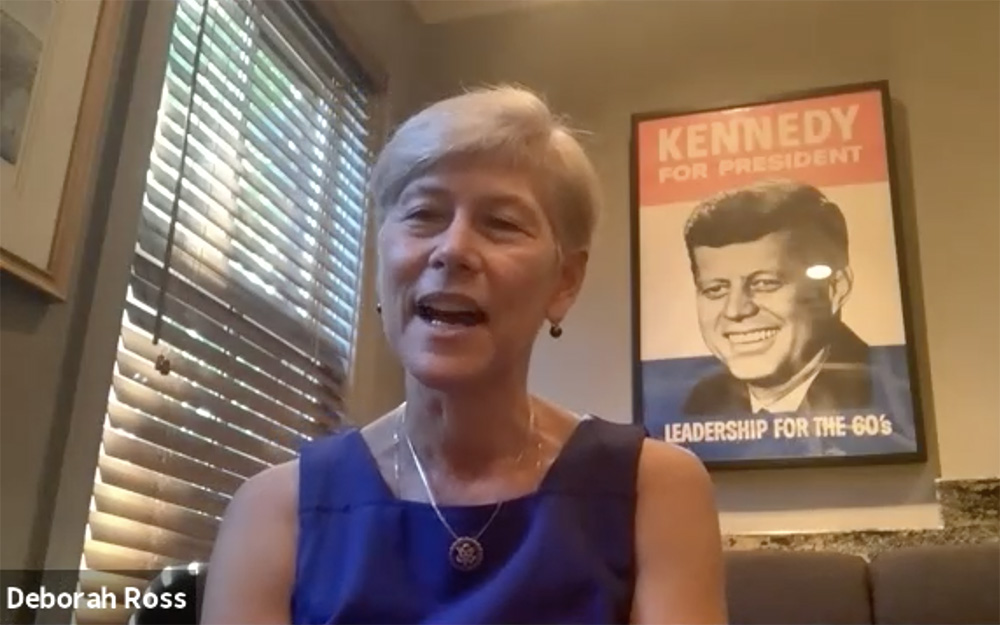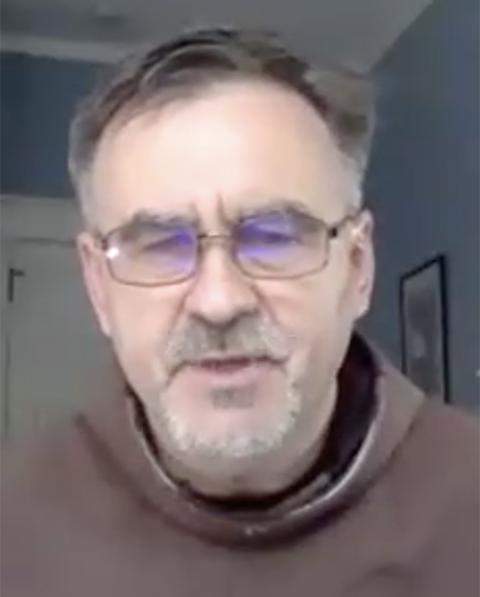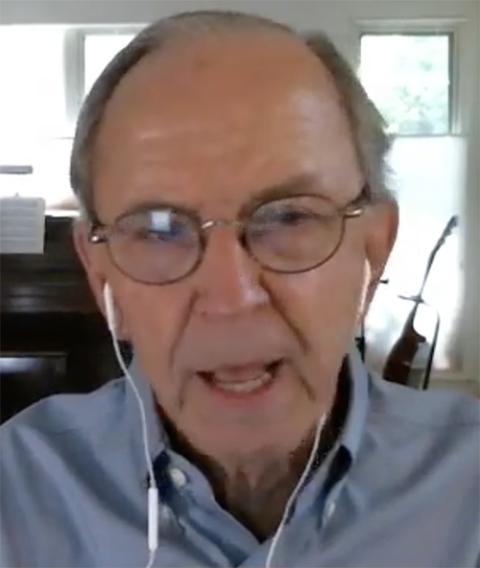
Rep. Deborah Ross, D-North Carolina, speaks during a dialogue on climate action with North Carolina faith leaders Sept. 27. (EarthBeat screenshot)
As Congress faces a critical week, with the nation's largest-ever federal climate initiatives on the line in two multitrillion-dollar legislative packages, a North Carolina representative said faith communities could play a key role in pushing both bills across the finish line.
During a dialogue on climate action with North Carolina faith leaders Sept. 27, U.S. Rep. Deborah Ross said that during a decade in the state legislature, she "personally witnessed the strength of the faith community" and its "power to persuade and to cross party lines" on civil rights and criminal justice issues. She also pointed to the efforts of religious groups, including the Catholic Health Association and many women religious congregations, in securing the 2010 Affordable Care Act.
Now the Democratic congresswoman is encouraging faith groups to do the same on the climate and environmental policies included in the federal government's $1.2 trillion infrastructure bill and $3.5 trillion reconciliation bill, which could face votes this week.
"It is time for the faith community to use its powerful and humble influence in this political sphere and to touch the lives of people like me who serve, because we all want to feel like we're doing what's good for people, doing what's good for the future, and respecting and serving our faith when we serve," she said.
The two bills include hundreds of billions of dollars in investments in environmental, energy and climate initiatives over the next decade. They form the backbone of President Joe Biden's climate agenda and the new U.S. pledge under the Paris Agreement to cut greenhouse gas emissions by 50% to 52% compared to 2005 levels by 2030.
Advertisement
Among the programs are:
- Measures to transition the national grid and public transportation to clean energy;
- Create incentives for electric vehicles and charging stations;
- Tax methane emissions;
- Replace lead pipes, cap orphaned gas wells and reduce pollution;
- Establish a Civilian Climate Corps;
- Enhance the nation's climate resiliency, especially for tribal and coastal communities.
Environmental activists, including numerous faith groups, have called the legislation a once-in-a-generation opportunity to make the deep cuts in greenhouse gas emissions from the United States, historically, the globe's leading source. Scientists say steep reductions are necessary to hold average global temperature rise to 1.5 degrees Celsius and avoid the most catastrophic impacts of climate change.

Franciscan Fr. Jacek Orzechowski, pastor of Immaculate Conception Parish in Durham, North Carolina (EarthBeat screenshot)
"The climate change emergency is profoundly a religious, spiritual and moral issue," Franciscan Fr. Jacek Orzechowski, pastor of Immaculate Conception Parish in Durham, North Carolina, said. He added that the urgency was underscored by a recent report from the scientific working group of the United Nations Intergovernmental Panel on Climate Change.
U.S. House Speaker Nancy Pelosi has targeted Thursday, Sept. 30, for a vote on the infrastructure package, but has not set a date for the larger $3.5 trillion "human infrastructure" bill that is moving through a budget reconciliation process — an attempt by Senate Democrats to pass it with a simple majority, rather than the 60 votes required to bypass a filibuster.
Although 19 Senate Republicans voted for the infrastructure bill in August, none is expected to support the reconciliation package.
Ross, a member of the House Committee on Science, Space and Technology and its energy subcommittee, said she was confident the House would pass both pieces of legislation. She said the investments in clean energy and boosting offshore wind power, particularly, were "an enormous personal priority."
"This is an investment not just in our current climate, which we know is undergoing extreme, extreme swings, and we suffer from that with weather emergencies and fires and all sorts of droughts, but it's an investment in our future. It's an investment in the next generation," Ross said.
The first-term congresswoman said she had not heard of potential cuts in climate programs as Democrats continue to negotiate the reconciliation bill, with some party members uncomfortable with its current $3.5 trillion price tag. Reuters later reported that Democrats were considering limiting electric vehicle rebates as one way to lower total spending.
During the event, Charles Coble of Orange-Chatham Interfaith Care for Creation in North Carolina said that group's member congregations "are deeply involved in earth-friendly practices" like recycling, composting and installing solar panels.

Charles Coble of Orange-Chatham Interfaith Care for Creation in North Carolina (EarthBeat screenshot)
"However, we're under no illusion that all of these efforts, and as laudable as they are, really can make a significant enough difference in climate change, even if they're widely adopted," Coble said.
"We need effective climate policies at the local, state and national levels. So we believe the voices of the faith communities are critical to making that happen," he added.
Echoing a major theme in Pope Francis' encyclical "Laudato Si', on Care for Our Common Home," Orzechowski drew a connection between the climate crisis and human migration, particularly recent scenes at the U.S. border, where the treatment of Haitian migrants, some of whom fled the island after environmental disasters, has drawn strong criticism from Catholics.
Any solution to either crisis must address both, said Orzechowski, who added that while ministering at the border two years ago, he heard Guatemalan immigrants describe how drought drove them to leave their homes and head north.
"If we remain on the same path, without those drastic reductions in greenhouse gas emissions, we are looking into hundreds of millions of displaced people," he said.
Ross, who spoke of how her Unitarian Universalist faith and her memory of the 1970s energy crisis influence her work, said she hoped that faith leaders will use their "power of moral persuasion, both on climate and immigration, because they are intertwined."
Asked by several participants how people of faith can most effectively urge political and business leaders to take serious steps on climate change, the congresswoman encouraged them to have one-on-one conversations and emphasize the impact that climate decisions will have, not just for people today but for future generations.
"The most powerful way, I believe, to persuade people is through love and compassion. And to tell them that by their acts, they can leave a legacy greater than themselves," Ross said. "These are the teachings of Scripture, and when you approach people in that way, I find that they feel that they then have the power to maybe do something that's bolder than what they did before."
It's important for faith groups to continue to speak out, she said, even if they're not heard the first time or don't see everything they advocated included in a final legislative package.
But she added, "I'm hopeful that we're going to see very, very positive change this week."








